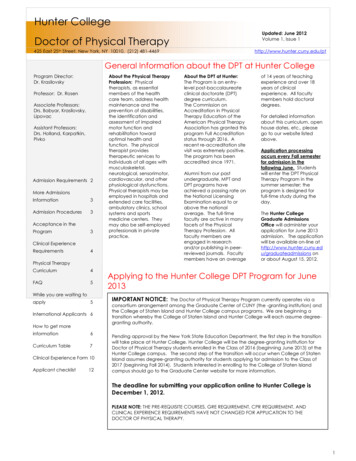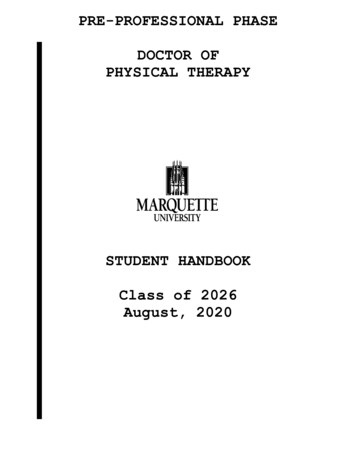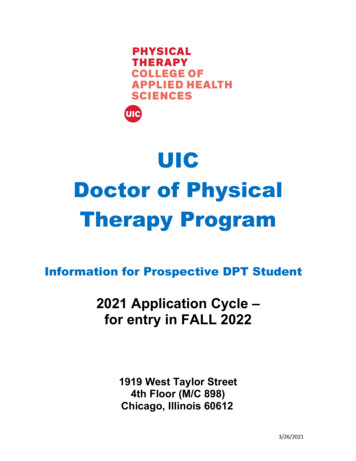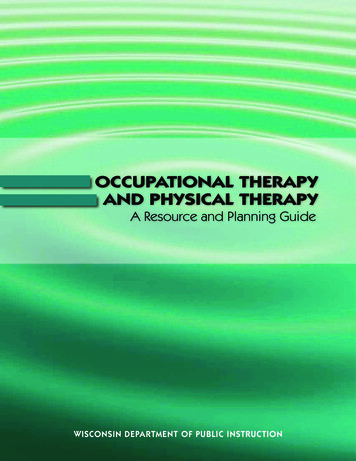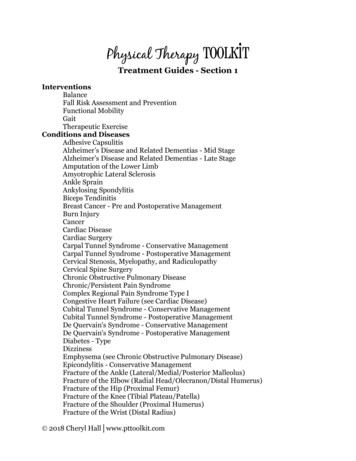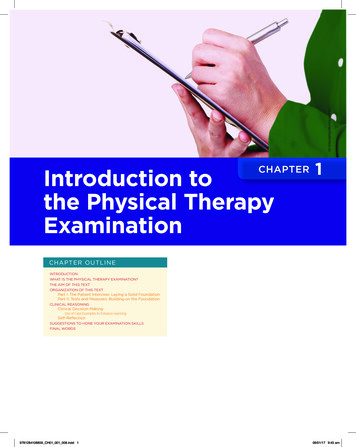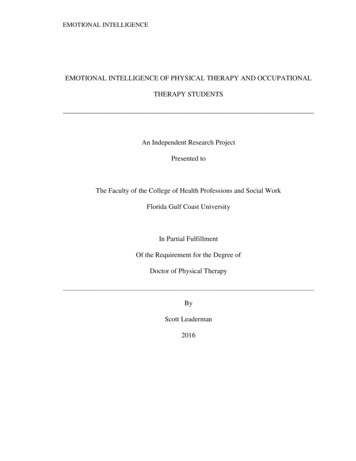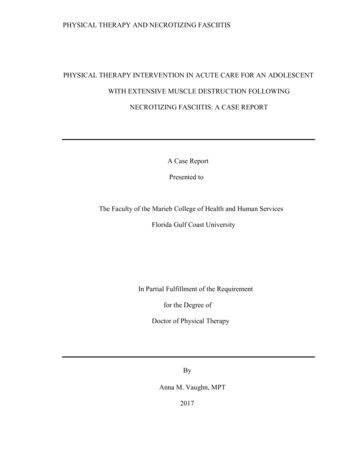
Transcription
HEGIS 1212.00ProposalDoctor of Physical Therapy (DPT)Hunter CollegeOf the City University of New YorkDates of Approval:School of Health Sciences Curriculum Committee: April 18, 2012School of Health Sciences Faculty: April 18, 2012Health Professions Divisional Curriculum Committee: April 23, 2012Graduate Course of Study Committee, Hunter College Senate: May 2, 2012Hunter College Faculty Senate: May 9, 2012Anticipated dates for implementation: June 2013Table of Contents1
HEGIS 1212.00File: DPT Proposal 4-23-2012Abstract.31. PURPOSE AND GOALS .42. NEED .5A. National Standards .5B. Student Needs .5C. Community Needs .6D. Needs of the University and the College .63. STUDENTS .7A. Projected Enrollment .7B. Admission Requirements .84. CURRICULUM.9A. Credit Requirements and Program Outline .9B. Academic Progress through the DPT Program . 141. Academic Courses . 142. Clinical Education Courses . 143. Professional Development I and II . 145. FACULTY . 15A. Full-Time Faculty . 15B. Adjunct Faculty . 16C. Clinical Faculty . 166. COST ASSESSMENT . 16A. Facilities . 17B. Library and Instructional Materials . 177. EVALUATION . 20A. Internal evaluation. 20B. Outcome Measures . 21C. External Evaluation . 21REFERENCES . 22Appendix 1 . 23Appendix 2 . 24Appendix 3 . 25Appendix 4 . 29Appendix 5 . 34Appendix 6 . 38Appendix 7 . 44Attachment Form A1 Program Content and Requirement. 53Attachment Form B2 Program Scheduling . 55Attachment Form D Faculty . 58List of TablesTable 1 Projected Graduate Center and Hunter College Enrollments to 2017 .8Table 2 Doctor of Physical Therapy Curriculum and Schedule by Year . 11Table 3 Graduate Center and Hunter College Tuition Estimates During Transition . 18Table 4 Projected Capital Expenditures for the Hunter College DPT Program. 192
HEGIS 1212.00File: DPT Proposal 4-23-2012AbstractThis proposal seeks approval to transfer the degree-granting authority for a Doctor of PhysicalTherapy (DPT) from the Graduate Center of CUNY to Hunter College and the College of StatenIsland. These two independent degree registrations will replace the existing Doctor of PhysicalTherapy (DPT) jointly offered by the Graduate Center of the City University of New York (thedegree-granting institution) and College of Staten Island and Hunter College. The mandate ofthe American Physical Therapy Association (APTA) requires the DPT as the entry-level degreefor the profession. The DPT curriculum prepares the graduate to examine, evaluate, diagnose,and intervene in the management of impairments, functional limitations and disabilities of thecardiopulmonary, musculoskeletal, neuromuscular and integumentary systems. The duration ofthe clinical internships which complement the curriculum will remain 34 weeks. The researchcomponent will require a publishable research project utilizing evidenced-based practice. Theprogram will meet changing national standards as well as community needs allowing graduatingphysical therapists to work in a multitude of settings. Expected enrollment at Hunter Collegewill be twenty-eight students for each year of the three-year program. Hunter College will acceptstudents to begin courses in the summer semester. Applicants must have an earned baccalaureatedegree along with specified course prerequisites. The three-year curriculum requires 105 creditsof graduate course work. The current facilities at Hunter College provide appropriate space andthe necessary equipment for the program. Tuition rates and student fees are based on currenttuition for Masters of Social Work and Doctor of Nursing Practice which include a tuitiondifferential. Monies collected from the tuition differential will be provided to the department tostrengthen the services to the students and the academic DPT curriculum.3
HEGIS 1212.00File: DPT Proposal 4-23-20121. PURPOSE AND GOALSHunter College proposes to offer a clinical doctoral program in physical therapy leading to theDoctor of Physical Therapy (DPT) degree. This new program will replace the current Doctor ofPhysical Therapy Degree administered jointly through the Graduate Center of the CityUniversity of New York (the degree-granting institution), Hunter College and the College ofStaten Island. The transfer of degree authority to Hunter College (and the College of StatenIsland) will bring students and faculty under the same administrative structure. Studentspresently enrolled in these programs will be able to graduate under the current Graduate Centeradministration, but no new students will be admitted to the joint program. Potential students willapply separately to either Hunter College or the College of Staten Island. The DPT programfollows the American Physical Therapy Association (APTA) mandate that physical therapists becredentialed with a doctoral degree, and conforms to curriculum guidelines set by theCommission on Accreditation in Physical Therapy Education (CAPTE)1. Conforming toCAPTE guidelines, each program site was separately accredited (see Appendix 1). Graduateswill be eligible to apply for licensure after successful completion of the National PhysicalTherapy Examination in New York and all other states. The strong applicant pool in the past fewyears assures that the Hunter College DPT program will be fully enrolled in the coming years.The DPT curriculum prepares students to become clinician-scientists who can competently applyresearch to clinical practice, perform all aspects of physical therapy (PT) practice, and performclinical research. Graduates of the DPT program administered through the Graduate Center ofCUNY, Hunter College and College of Staten Island have been prepared to accept entry-levelphysical therapist positions throughout the country. The proposed Hunter College DPTcurriculum will maintain the same core curriculum previously accredited by CAPTE andfollowed over the past 4 years with the following exceptions which occur in the Fall semester ofYear 1: Human Physiology and Exercise Physiology (PHT 720) will be expanded to include a 1credit laboratory; and, merging of Introduction to Physical Therapy Practice & Ethics (PHT70400, 2 credits) and Psychosocial Aspects of Clinical Practice (PHT 70600, 2 credits) into anew course entitled Ethical and Psychosocial Dimensions of PT Practice (3 credits). The corecurriculum will continue its inclusion of adult and pediatric musculoskeletal, neuromuscular,cardiopulmonary, and integumentary examination and intervention with an emphasis on highlevel differential diagnosis, clinical decision making, research, radiology/ imaging, health caremanagement, evidence-based practice, prevention/ wellness/ health promotion, and pathology.The clinical education experiences will continue to have the same distribution throughout thecurriculum as they have had in the past. The research requirement will include a publishableresearch project which exemplifies evidence-based practice.The faculty has a strong commitment to educate students about safe, ethical, and effectivepractice based upon sound clinical rationale. There is a strong emphasis on developing afoundation in the basic and clinical sciences. Courses dealing with patient managementemphasize a problem-solving approach to the examination of the patient and appropriateintervention. Educational emphasis is placed on a thorough examination with ongoing reexamination to ensure that patients receive the most effective and cost-efficient care.In summary, this curriculum offers a sound educational background that will better equip thegraduate to examine, evaluate, diagnose, and intervene in the management of impairments,functional limitations, and disabilities of the cardiopulmonary, musculoskeletal, neuromuscular,and integumentary systems (See Appendix 2. Physical Therapy Scope of Practice).4
HEGIS 1212.00File: DPT Proposal 4-23-20122. NEEDThis program is designed to provide students with professional skills at the level of the clinicaldoctorate. They will obtain this education while meeting professional, accreditation, andlicensure requirements to practice physical therapy. With the emphasis on autonomous practiceand the critical need to provide evidence-based practice, physical therapy clinicians needdoctoral-level education in differential diagnosis, clinical decision-making, implementation ofinnovative models of care and business practices, and government regulations. In response tothese changes, APTA resolved that the DPT is the appropriate degree for the profession. Thisproposed DPT complies with this resolution.A. National StandardsIn June 2000, APTA adopted the position that the DPT is the appropriate degree for theprofession. According to the APTA Vision Statement, “By 2020, physical therapy will beprovided by physical therapists who are doctors of physical therapy, recognized by consumersand other health care professionals as practitioners of choice to whom consumers have directaccess for the prevention, diagnosis, and appropriate interventions for impairments, functionallimitations, and disabilities related to movement, function and health" (2000 House of DelegatesMeeting of APTA).The Hunter College DPT program as an affiliate of the Graduate Center program, was designedto meet the changing national standards for accredited physical therapy programs. The programreceived full accreditation for the maximum of 10 years from CAPTE through 2016. Byachieving accreditation, the program demonstrated that it met national standards. All accreditedphysical therapy educational programs are required to complete an annual accreditation report.Compliance with these requirements will insure that the program continues to meet nationalstandards. See letter from CAPTE that supports the fact that the program and not the institutionis accredited (see Appendix 1).B. Student NeedsThe clinical Doctor of Physical Therapy program provides students with knowledge, skills, andqualifications to enter independent practice and perform clinical research. Graduates will havethe skills to play an important role in the delivery of health care services within a dynamic healthcare system. They will have the ability to provide excellent clinical services, assumeadministrative positions, and conduct clinical research with the purpose of improving servicesand treatment approaches. Graduates will complete a curriculum that prepares them for passingthe National Physical Therapy Examination (administered by the Federation of State Board ofPhysical Therapy Examiners (FSBPTE), which is a requirement for being hired and provides a finaloutcome measure for the DPT program.We have observed regionally and nationally a significant increase in the number ofemployment opportunities available to new graduates. The proposed DPT curriculum anddoctoral degree will increase competitiveness for the best job opportunities available. Thegoals of the Physical Therapy Program are to select and prepare promising candidates withthe skills and knowledge necessary to adapt to the changing needs of the health care deliverysystem, to diagnose and define essential clinical problems, and to formulate interventions that5
HEGIS 1212.00File: DPT Proposal 4-23-2012result in outcomes that enhance the patient’s quality of life. A graduate from this programwill have the confidence and competencies that are necessary to demonstrate leadership inmeeting society’s health care needs. The graduate will contribute to the body of knowledgeof care of physical and movement disorders through systematic clinical inquiry to optimizerecovery of people entrusted to their care. With their students, the physical therapy facultyseeks to explore the frontiers of knowledge relating to the prevention and elimination ofmovement disorders and physical pathologies. When these pathologies cannot be reversed,faculty and students will define and monitor the principles of rehabilitation that ensureoutcomes resulting in an optimal quality of life outcome for recipients. Using an evidencebased practice model, the physical therapy faculty seeks effective and innovativeinterventions to teach students how to the prevent and eliminate pain and movementdisorders, assist recovery of function and provide compassionate, culturally sensitive carewithin an urban health care environment.C. Community NeedsPhysical Therapy is a profession that is vital for society. As our population ages, the number ofpeople requiring rehabilitation for acute and chronic conditions will increase. Physical therapistswork in a multitude of clinical and recreational settings, and their contribution to healthpromotion has rapidly expanded.Based on current 2011 U.S. Department of Labor Statistics2, employment for physical therapiststhrough 2018 is expected to grow by 30 percent and much faster than the average for alloccupations. The increased need for physical therapists is a result of the rapid growth in thenumber of middle-aged and elderly individuals who require therapeutic and rehabilitationservices. The rapidly growing elderly population is particularly vulnerable to chronic anddebilitating conditions that require therapeutic services. Also, the baby-boom generation isentering the prime age for heart attacks and strokes, increasing the demand for cardiac andphysical rehabilitation. In addition, younger people will need physical therapy as technologicaladvances save the lives of a larger proportion of newborns with severe birth defects. Futuremedical developments will permit higher survival rates of trauma victims, creating yet anotherservice demand for rehabilitative care. Widespread interest in health promotion will alsoincrease demand for physical therapy services. A growing number of employers are usingphysical therapists to evaluate worksites, develop exercise programs, and teach safe work habitsto employees in the hope of reducing injuries. Based on current New York State OccupationalOutlook to 20123, the projected growth of new jobs for physical therapists is 20 percent in NewYork City area, similar to state-wide projections.D. Needs of the University and the CollegeThe mission, vision, and values of CUNY and Hunter College address students’ accessibility tocompetitive and rigorous professional programs and excellence in teaching and research. Equityin availability of this education has been a long-standing CUNY tradition. In addition,institutional directions include achievement of regional, national, and international recognition.The mission o
The Hunter College DPT program as an affiliate of the Graduate Center program, was designed to meet the changing national standards for accredited physical therapy programs. The program received full accreditation for the maximum of 10 years from CAPTE through 2016. By
